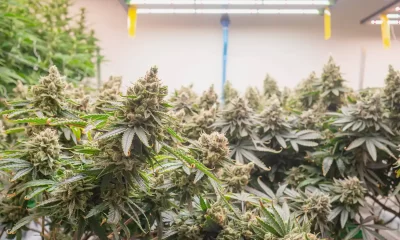Business
Mars Wrigley Wins Lawsuit Against Cannabis Companies Selling Skittles Trademark

Mars Wrigley candy company recently won a trademark lawsuit in regards to the illegal use of the Skittles brand name.
Mars Canada Inc., global candy giant and Mars Wrigley, which oversees confections such as of M&M’S®, SNICKERS®, ORBIT®, EXTRA® and Skittles®, recently concluded a lawsuit involving the use of the Skittles logo on illegal cannabis products. On Aug. 12, a federal Judge Patrick Gleeson ruled that three online cannabis retailers “deliver up and destroy all infringing products and packaging,” and also pay various sums for infringing upon Mars’s trademark.
“I also find that advertising and offering for sale of a potentially dangerous product using appropriated trademarks that are evidently and obviously attractive to children represents a marked departure from ordinary standards of decent behaviour that deserves to be denounced and deterred,” Gleeson wrote in the motion.
“I have placed significant weight on the issue of harm not only to the Plaintiff but also to members of the public who might accidentally consume the Defendants’ Infringing Product believing it to be a genuine SKITTLES product. The fact that SKITTLES are a confectionary product that are attractive to children reinforces the need to denounce the Defendants’ conduct,” Gleeson continued.
Mars initially filed the lawsuit in May 2021, claiming that the illegal retailers infringed on Mars’s registered trademarks. “Mars Wrigley strongly condemns the use of popular candy brands in the marketing and sale of THC products, which is grossly deceptive and irresponsible,” the company stated in a press release. “The use of Mars Wrigley’s brands in this manner is unauthorized, inappropriate, and must cease, especially to protect children from mistakenly ingesting these unlawful THC products.”
The company specifically mentioned products called “Medicated Skittles,” “Starburst Gummies,” and “Life Savers Medicated Gummies” that were being illegally sold on e-commerce sites in Canada and the U.S. According to a complaint filed in Riverside, California at the time, these products “pose a great danger to the public as anyone, children and adults alike, could easily mistake the infringing cannabis-infused products for Wrigley’s famous and beloved candies and inadvertently ingest.”
According to the National Post, Mars hired private detectives to purchase product lookalikes that infringed upon the company’s trademarks.
In August 2017, the Ohio-based glue company that produces Gorilla Glue took GG Strains to court due to the use of “Gorilla Glue” in numerous strain names. By October, a settlement was reached, which stated that Gorilla Glue #1, #4, and #5, would no longer be used, and instead be replaced with GG1, GG4, GG5, etc. The cultivator’s website domain would also be transferred to the Gorilla Glue company ownership by January 2020, among other stipulations.
Although it was a major setback, Ross Johnson, Co-founder of GG Strains and Gorilla Glue, was confident that that it could bounce back. “We’re going to survive; we’re going to overcome it,” Johnson said. “Is it a setback? Most definitely, it is a setback. But it’s all behind us now, and it’s allowing us to move forward.” Sadly, Johnson passed away in 2019, followed by his co-founder, Don Peabody (also known as Joesy Whales), in 2020, according to the Cannabis Business Times.
Similar legal moves have been made in regard to other famous trademarked brands as well. In February 2018, the company went after cannabis companies who were infringing upon the Hershey’s Chocolate trademarked products. In February 2019, a group of delivery businesses called United Pot Smokers, UPS420, and THCPlant, were brought to court by UPS (United Parcel Service) regarding misleading brand identifiers. Later in July 2019, Sour Patch Kids candy maker targeted an illegal cannabis edibles product called “Stoney Patch” for infringing upon the trademark.
Business
New Mexico cannabis operator fined, loses license for alleged BioTrack fraud

New Mexico regulators fined a cannabis operator nearly $300,000 and revoked its license after the company allegedly created fake reports in the state’s traceability software.
The New Mexico Cannabis Control Division (CCD) accused marijuana manufacturer and retailer Golden Roots of 11 violations, according to Albuquerque Business First.
Golden Roots operates the The Cannabis Revolution Dispensary.
The majority of the violations are related to the Albuquerque company’s improper use of BioTrack, which has been New Mexico’s track-and-trace vendor since 2015.
The CCD alleges Golden Roots reported marijuana production only two months after it had received its vertically integrated license, according to Albuquerque Business First.
Because cannabis takes longer than two months to be cultivated, the CCD was suspicious of the report.
After inspecting the company’s premises, the CCD alleged Golden Roots reported cultivation, transportation and sales in BioTrack but wasn’t able to provide officers who inspected the site evidence that the operator was cultivating cannabis.
In April, the CCD revoked Golden Roots’ license and issued a $10,000 fine, according to the news outlet.
The company requested a hearing, which the regulator scheduled for Sept. 1.
At the hearing, the CCD testified that the company’s dried-cannabis weights in BioTrack were suspicious because they didn’t seem to accurately reflect how much weight marijuana loses as it dries.
Company employees also poorly accounted for why they were making adjustments in the system of up to 24 pounds of cannabis, making comments such as “bad” or “mistake” in the software, Albuquerque Business First reported.
Golden Roots was fined $298,972.05 – the amount regulators allege the company made selling products that weren’t properly accounted for in BioTrack.
The CCD has been cracking down on cannabis operators accused of selling products procured from out-of-state or not grown legally:
- Regulators alleged in August that Albuquerque dispensary Sawmill Sweet Leaf sold out-of-state products and didn’t have a license for extraction.
- Paradise Exotics Distro lost its license in July after regulators alleged the company sold products made in California.
Golden Roots was the first alleged rulebreaker in New Mexico to be asked to pay a large fine.
Source: https://mjbizdaily.com/new-mexico-cannabis-operator-fined-loses-license-for-alleged-biotrack-fraud/
Business
Marijuana companies suing US attorney general in federal prohibition challenge

Four marijuana companies, including a multistate operator, have filed a lawsuit against U.S. Attorney General Merrick Garland in which they allege the federal MJ prohibition under the Controlled Substances Act is no longer constitutional.
According to the complaint, filed Thursday in U.S. District Court in Massachusetts, retailer Canna Provisions, Treevit delivery service CEO Gyasi Sellers, cultivator Wiseacre Farm and MSO Verano Holdings Corp. are all harmed by “the federal government’s unconstitutional ban on cultivating, manufacturing, distributing, or possessing intrastate marijuana.”
Verano is headquartered in Chicago but has operations in Massachusetts; the other three operators are based in Massachusetts.
The lawsuit seeks a ruling that the “Controlled Substances Act is unconstitutional as applied to the intrastate cultivation, manufacture, possession, and distribution of marijuana pursuant to state law.”
The companies want the case to go before the U.S. Supreme Court.
They hired prominent law firm Boies Schiller Flexner to represent them.
The New York-based firm’s principal is David Boies, whose former clients include Microsoft, former presidential candidate Al Gore and Elizabeth Holmes’ disgraced startup Theranos.
Similar challenges to the federal Controlled Substances Act (CSA) have failed.
One such challenge led to a landmark Supreme Court decision in 2005.
In Gonzalez vs. Raich, the highest court in the United States ruled in a 6-3 decision that the commerce clause of the U.S. Constitution gave Congress the power to outlaw marijuana federally, even though state laws allow the cultivation and sale of cannabis.
In the 18 years since that ruling, 23 states and the District of Columbia have legalized adult-use marijuana and the federal government has allowed a multibillion-dollar cannabis industry to thrive.
Since both Congress and the U.S. Department of Justice, currently headed by Garland, have declined to intervene in state-licensed marijuana markets, the key facts that led to the Supreme Court’s 2005 ruling “no longer apply,” Boies said in a statement Thursday.
“The Supreme Court has since made clear that the federal government lacks the authority to regulate purely intrastate commerce,” Boies said.
“Moreover, the facts on which those precedents are based are no longer true.”
Verano President Darren Weiss said in a statement the company is “prepared to bring this case all the way to the Supreme Court in order to align federal law with how Congress has acted for years.”
While the Biden administration’s push to reschedule marijuana would help solve marijuana operators’ federal tax woes, neither rescheduling nor modest Congressional reforms such as the SAFER Banking Act “solve the fundamental issue,” Weiss added.
“The application of the CSA to lawful state-run cannabis business is an unconstitutional overreach on state sovereignty that has led to decades of harm, failed businesses, lost jobs, and unsafe working conditions.”
Business
Alabama to make another attempt Dec. 1 to award medical cannabis licenses

Alabama regulators are targeting Dec. 1 to award the first batch of medical cannabis business licenses after the agency’s first two attempts were scrapped because of scoring errors and litigation.
The first licenses will be awarded to individual cultivators, delivery providers, processors, dispensaries and state testing labs, according to the Alabama Medical Cannabis Commission (AMCC).
Then, on Dec. 12, the AMCC will award licenses for vertically integrated operations, a designation set primarily for multistate operators.
Licenses are expected to be handed out 28 days after they have been awarded, so MMJ production could begin in early January, according to the Alabama Daily News.
That means MMJ products could be available for patients around early March, an AMCC spokesperson told the media outlet.
Regulators initially awarded 21 business licenses in June, only to void them after applicants alleged inconsistencies with how the applications were scored.
Then, in August, the state awarded 24 different licenses – 19 went to June recipients – only to reverse themselves again and scratch those licenses after spurned applicants filed lawsuits.
A state judge dismissed a lawsuit filed by Chicago-based MSO Verano Holdings Corp., but another lawsuit is pending.
Source: https://mjbizdaily.com/alabama-plans-to-award-medical-cannabis-licenses-dec-1/
-

 Business2 years ago
Business2 years agoPot Odor Does Not Justify Probable Cause for Vehicle Searches, Minnesota Court Affirms
-

 Business2 years ago
Business2 years agoNew Mexico cannabis operator fined, loses license for alleged BioTrack fraud
-

 Business2 years ago
Business2 years agoAlabama to make another attempt Dec. 1 to award medical cannabis licenses
-

 Business2 years ago
Business2 years agoWashington State Pays Out $9.4 Million in Refunds Relating to Drug Convictions
-

 Business2 years ago
Business2 years agoMarijuana companies suing US attorney general in federal prohibition challenge
-

 Business2 years ago
Business2 years agoLegal Marijuana Handed A Nothing Burger From NY State
-

 Business2 years ago
Business2 years agoCan Cannabis Help Seasonal Depression
-

 Blogs2 years ago
Blogs2 years agoCannabis Art Is Flourishing On Etsy













